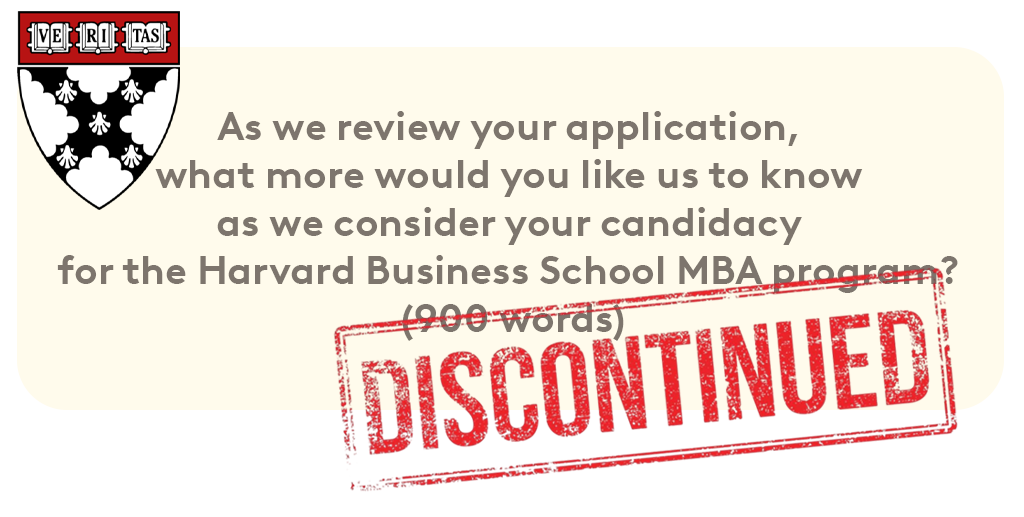
June 2024 marked a significant shift in Harvard Business School’s MBA admissions process, with the first major update to the essay component of the application since 2016.
That is, the 900-word, open-ended HBS essay—As we review your application, what more would you like us to know as we consider your candidacy for the Harvard Business School MBA program?—has been discontinued in lieu of three shorter prompts.
In this article, we’ll cover the new HBS essays, speculate on why the changes were made, and give our best advice on how Harvard Business School applicants should tackle the new essay themes.
Harvard Business School’s MBA essay prompts appeal to “business-minded”, “leadership-focused”, and “growth-oriented” individuals.
The prompts are:
At first glance, MBA applicants might feel some relief when reading the requirements for these new prompts. Yes, they’re 100 words shorter, but there’s also much more guidance about what to write about—it would seem.
However, the narrower the focus, the easier it is for you to “lose the thread” and get bogged down in the language of the prompt.
Increased specificity can also lead to formulaic responses, which lack the personal storytelling that helps your essays standout. (It also increases the chances of applicants turning to ChatGPT or other LLMs for assistance).
As a result, we feel that you’re going to have to work a little harder to distinguish yourself when responding to these prompts—and you’re going to have to resist the temptation to use ChatGPT for your HBS application.
The biggest pitfall MBA applicants fall into with specific, shorter essays like these is to respond too directly to the prompt without considering the bigger picture.
When approaching the essay writing process, don’t worry too much about the exact themes in each prompt. Instead, reflect on the reasons you feel you should be admitted to HBS in general.
Think through your answers to the following questions:
By orienting yourself to the bigger picture, you can avoid focusing too narrowly on “curiosity” or “leadership qualities.”
Next, think about the topics you don’t need to address in your essays. Factors such as academic ability and career experience will be covered separately in the application or the resume.
Decide what hasn’t been addressed elsewhere, and strategize on how to work this information into the prompts provided.
This is where a consultant can mean the difference between a generic essay and a memorable and highly impactful response. An MBA admissions consultant can help you think through your motivations and craft MBA essays that seamlessly complement your application while showcasing your personality.
If you’re looking for even more insight about how to tackle the three HBS prompts, consider our advice on writing a strong MBA personal statement—including 4 common mistakes you’ll want to avoid.
We don’t have any insider information on why the original HBS essay prompt was replaced, but we can speculate generally on some factors that might have led to this moment.
In October 2023, Rupal Gadhia joined Harvard Business School as the Managing Director of Admissions and Financial Aid. These changes coincide with her tenure, and we can safely assume that this is not a coincidence.
Typically, when admissions essays shift from longer, open-ended prompts to shorter, more focused ones, it’s because many applicants were not effectively addressing the essay’s purpose and were using the space ineffectively.
Perhaps the regime change paved the way for this update—perhaps it was even in the works for some time.
In addition to a new Director of Admissions, the HBS essay updates also seem to align with a change in the types of candidates HBS is seeking to admit.
In previous cycles, Harvard Business School has been quite direct about its interest in individuals with a “habit” of leadership and an analytical aptitude and appetite.
However, this cycle sees a shift towards a broader, softer set of qualities, potentially setting the runway for a minor increase in non-traditional MBA admits.
These qualities directly correspond to the new HBS essays, and Harvard Business School gives some guidance as to how certain candidates should interpret the purpose of the new prompts.
As stated on the “Who Are We Looking For?” page, the HBS admissions team will look for individuals who…
Now, it is important to remember that Harvard Business School relies heavily on its donors and its reputation with recruiters, who in turn depend on the MBA class composition as it stands today. So we are not likely to see a large shake-up of the school’s MBA class profile overnight.
Further, it’s impossible to predict what industries and profiles are likely to benefit from these changes in admissions criteria.
But if the essay prompts and changes to admissions criteria are genuine and indicative of a broader shift in admissions committee thinking, then we can expect to see individuals who invest in others (especially those who are different from themselves) fare quite well.
These changes to the HBS application essays coincide with the appointment of a new Managing Director of Admissions and Financial Aid and a subtle broadening of the admissions criteria for HBS’s MBA class.
While these shifts may not lead to a dramatic change in the class profile overnight, they do signal an evolving approach to assessing candidates.
For applicants, the key takeaway is to pay close attention to the new essay prompts without getting bogged down by the specific themes.
It’s essential to maintain a holistic view of your MBA applications, emphasizing your overall qualifications, goals, and the unique experiences that align with each program’s values.
Engaging an MBA admissions consultant can be a strategic move, offering you tailored insights and helping you craft Harvard MBA essays that stand out. By focusing on the bigger picture and strategically addressing the prompts, you can present a strong, authentic application that highlights your readiness for the HBS MBA program.